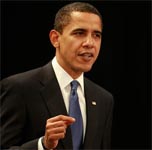Obama warns Iran to quickly "come clean" on nuke plant
 Pittsburgh, Pennsylvania - US President Barack Obama warned Iran Friday it must soon "come clean" about its nuclear activities to avoid heading down a path of "confrontation" with global powers.
Pittsburgh, Pennsylvania - US President Barack Obama warned Iran Friday it must soon "come clean" about its nuclear activities to avoid heading down a path of "confrontation" with global powers.
Obama said he expected answers from Iran when officials from six countries leading the international effort to curtail Iran's nuclear programme meet with Iranian representatives next week in Geneva.
"Iran is on notice that, when we meet with them on (Thursday) October 1, they are going to have to come clean, and they are going to have to make a choice," Obama said at the conclusion of the Group of 20 summit in Pittsburgh, Pennsylvania.
The United States, Britain and France on Friday accused Tehran of deliberately concealing from UN inspectors a nuclear plant in southern Iran for enriching uranium.
Iranian President Mahmoud Ahmadinejad denied the charges at a press conference in New York, saying the International Atomic Energy Agency had long ago been informed of the facility.
Obama did not rule out the possibility of using military force if diplomatic efforts fail to resolve the dispute but emphasized his approach of seeking a solution through negotiations.
"I've always said that we do not rule out any options when it comes to US security interests, but I will also re-emphasize that my preferred course of action is to resolve this in a diplomatic fashion," he said. "It's up to the Iranians to respond."
The IAEA confirmed Friday that it had received a letter on Monday from Iran confirming the existence of the plant near the city of Qom. The IAEA had previously be aware only of the first facility for enriching uranium near Natanz.
Before the start of Friday's G20 session, Obama addressed reporters alongside British Prime Minister Gordon Brown and French President Nicolas Sarkozy to announce that intelligence showed the plant existed and that it was not designed for producing nuclear material for peaceful energy production.
Senior US officials speaking on the condition that they not be identified said the plant could only be used for producing uranium for nuclear weapons - that it was too small to support civilian uses.
Brown and Sarkozy called for moving swiftly to get UN Security Council sanctions imposed if Iran does not soon clarify its nuclear ambitions and allow IAEA inspectors into the site.
Obama said the reactions to the disclosure of the second plant from the five permanent members of the Security Council - Britain, China, France, Russia and the United States - demonstrated a unified determination to prevent Iran from acquiring nuclear weapons.
"When we find that diplomacy does not work, we will be in a much stronger position to, for example, apply sanctions that have bite," he said.
Those five countries plus Germany will be sending representatives to meet with the Iranians Thursday in Geneva.
The Security Council has in recent years enacted three resolutions containing mild sanctions on Iran. Britain, France and the United States sought harsher measures but encountered resistance from the two other veto-wielding permanent members of the council: China and Russia.
Russian President Dmitry Medvedev, however, this week signalled a willingness to accept harsher sanctions, in part because of Obama's decision to drop Bush-era plans to station a long-range missile- defence system in Eastern Europe - an issue that dragged relations between the two countries to their lowest point since the end of the Cold War.
"When all instruments have been used and failed, one can use international legal sanctions," Medvedev said at the University of Pittsburgh shortly before the G20 summit began Thursday.
The Chinese still appear reluctant. Speaking on the sidelines of the G20, Chinese Foreign Minister Ma Zhaoxu rejected the use of sanctions to punish Iran for failing to disclose the site.
"I don't like the word punishment," Ma said through a translator. "I think all of the issues can only be solved through dialogue and negotiations." (dpa)